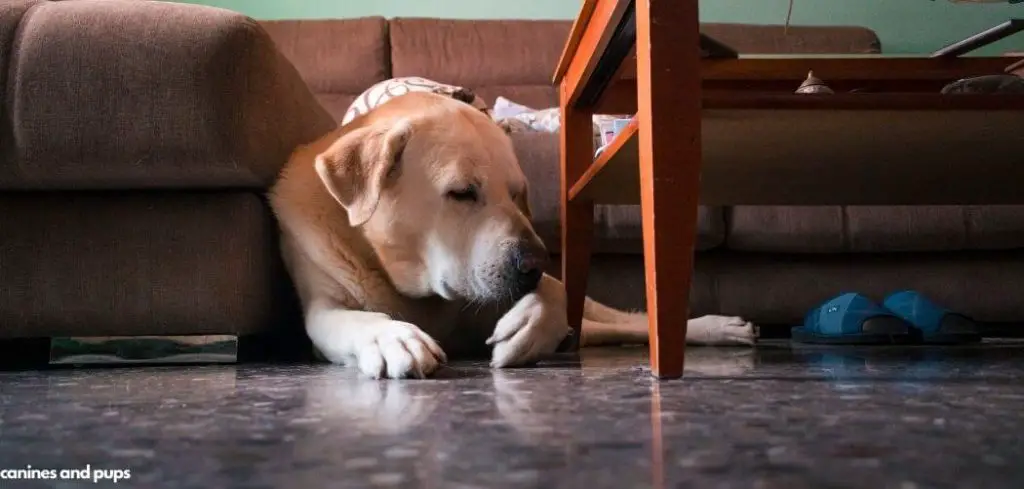It can be worrying to notice your old dog excessively licking their paws. While the behavior might seem harmless at first, constant licking can signal underlying health issues.
We outline the common reasons why an old dog may excessively lick their paws, what you can do at home, and when to seek veterinary help.
Old Dog Excessively Licking Paws — Why It Happens
When senior dogs lick their paws excessively, it is usually a sign of discomfort, irritation, or stress. Common reasons include allergies, arthritis-related pain, skin infections, anxiety, or even something stuck between their paw pads.
For older dogs, changes in mobility, weakened immunity, or age-related skin sensitivity can make paw licking more frequent and concerning.

Old Dog Excessively Licking Paws: Common Causes
Allergies
Allergies are one of the most frequent causes of paw licking in older dogs. Environmental triggers like pollen, dust mites, or grass can irritate the skin.
Food sensitivities may also cause itching that makes your dog chew and lick their paws.
You may notice redness, swelling, or hair loss around the paw area. Chronic licking can worsen inflammation and even lead to secondary infections. Because older dogs’ immune systems are more fragile, allergic reactions can appear more severe.
Read more: Old Dog Excessively Licking (What it means)
Arthritis and Joint Pain
Arthritis is very common in senior dogs and often manifests as stiffness or joint pain. Dogs sometimes lick at painful joints or nearby paws in an instinctive attempt to soothe discomfort.
If your dog struggles to rise, hesitates on stairs, or shows stiffness after resting, arthritis could be the root cause.
Constant licking may not only fail to relieve the pain but can also create skin irritation over time.
Skin Infections
Bacterial or fungal infections in the paws can cause itching, burning, or pain, prompting your dog to lick excessively. These infections might develop after minor cuts, cracks, or irritation from constant chewing.
Signs include foul odor, discharge, redness, or crusty skin between the toes. Because older dogs heal more slowly, infections may persist longer and become chronic without treatment.
Anxiety or Stress
Senior dogs can become more anxious as they age, especially if their hearing, vision, or mobility declines. Repetitive behaviors like paw licking often serve as self-soothing mechanisms.
If your dog tends to lick more when left alone, during storms, or in new environments, stress may be the culprit. Unlike medical issues, anxiety-driven licking usually doesn’t produce swelling or sores—unless the behavior becomes compulsive.
Parasites
Fleas, mites, or ticks can irritate the paws, leading to relentless licking. Older dogs may be more sensitive to these pests, especially if their coat is thinning or skin is fragile.
Even if you don’t immediately see parasites, microscopic mites or flea allergies can still trigger severe itching. Left untreated, this irritation can escalate into sores or infections.
Foreign Objects
Sometimes the simplest explanation is the right one. A thorn, grass seed, or splinter stuck in your dog’s paw pad can cause sudden and persistent licking. Senior dogs with less mobility may struggle to remove the object themselves, making the irritation worse.
Checking your dog’s paws regularly can help you identify and remove these culprits before they cause ongoing problems.
What to Do If Your Old Dog Is Excessively Licking Its Paws
If your old dog is licking their paws often, start by gently inspecting the area for cuts, swelling, or lodged objects. Wash the paws with mild, dog-safe soap and warm water to remove allergens or debris.
For mild irritation, using a soothing paw balm or coconut oil may help calm the skin. Keeping the paws clean and dry also prevents bacterial or fungal buildup.
If allergies seem likely, talk to your vet about diet adjustments or antihistamines suited for dogs. For arthritis, supplements like glucosamine or omega-3 fatty acids may provide relief, though professional guidance is essential before starting anything new.
Make sure your dog gets plenty of mental stimulation and comfort. If anxiety is the driver, puzzle toys, calming sprays, or simply more attention can reduce compulsive licking.
When to Call or Visit Your Vet
If your dog’s paw licking is persistent, worsening, or causing sores, it’s important to consult a veterinarian. Red flags include open wounds, bleeding, swelling, foul odors, or sudden behavioral changes.
Call your vet if your old dog shows additional symptoms like limping, loss of appetite, lethargy, or fever. These could indicate systemic issues like arthritis flare-ups, infections, or more serious health concerns.
Immediate veterinary attention is also needed if your dog appears in pain, is excessively restless, or if the licking continues despite at-home care. Senior dogs are more vulnerable, so timely treatment is key to preventing complications.
Read more: Dog licking paws excessively (What it might mean)
Key Takeaway
When an old dog is excessively licking their paws, it’s often more than just a quirky habit. Allergies, pain, anxiety, infections, or even foreign objects could be to blame.
By monitoring their symptoms, providing comfort at home, and seeking veterinary care when needed, you can help your senior dog stay comfortable and healthy.
Paw licking is their way of telling you something is wrong—listening and acting early makes all the difference.
